|
Here are all the paintings of FOPPA, Vincenzo 01
| ID |
Painting |
Oil Pantings, Sorted from A to Z |
Painting Description |
| 6688 |
 |
Bottigella Altarpiece dh |
1480-84
Wood panel
Musei Civici, Pavia |
| 6690 |
 |
Madonna and Child dfg |
1476
Tempera on panel, 165 x 80 cm
Pinacoteca di Brera, Milan |
| 29795 |
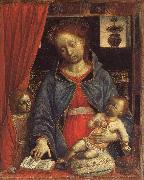 |
Madonna and Child with an Angel |
mk67
Tempera on panel
16 1/8/x12 13/16in
Uffizi,Gallery
|
| 6691 |
 |
Madonna and Child with an Angel deu |
1479-80
Tempera on wood, 41 x 32,5 cm
Galleria degli Uffizi, Florence |
| 6689 |
 |
Madonna and Child with St John the Baptist and St John the Evangelist dfhj |
1485
Fresco transferred to canvas, 170 x 190 cm
Pinacoteca di Brera, Milan |
| 6692 |
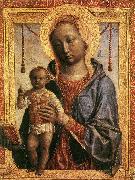 |
Madonna of the Book d |
1460-68
Wood panel
Castello Sforzesco, Milan |
| 6693 |
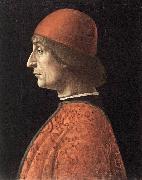 |
Portrait of Francesco Brivio sdf |
Wood
Museo Poldi Pezzoli, Milan |
| 6694 |
 |
St Augustine dsfg |
1465-70
Wood panel
Castello Sforzesco, Milan |
| 6686 |
 |
St Michael Archangel (detail) sdf |
Tempera on wood, 89 x 34 cm (full panel)
The Hermitage, St. Petersburg |
| 6685 |
 |
St Stephen the Martyr dfg |
Tempera on wood, 89 x 34 cm
The Hermitage, St. Petersburg |
| 6687 |
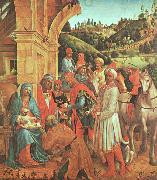 |
The Adoration of the Kings dfg |
1500-10
Panel, 239 x 200 cm
National Gallery, London |
| 63831 |
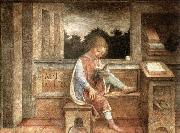 |
The Young Cicero Reading |
1464 Fresco, 101,6 x 143,7 cm Wallace Collection, London This is the only surviving fresco fragment from the Palazzo Mediceo, Milan. It was cut from the wall c. 1863.Artist:FOPPA, Vincenzo Title: The Young Cicero Reading Painted in 1451-1500 , Italian - - painting : historical |
|
|
| FOPPA, Vincenzo
|
| Italian Early Renaissance Painter, ca.1430-1515
was a Northern-Italian Renaissance painter. He was an elderly contemporary of Leonardo da Vinci. Born at Bagnolo Mella, near Brescia in the Republic of Venice, he settled in Pavia around 1456, serving the dukes of Milan and emerging as one of the most prominent Lombard painters. Foppa returned to Brescia in 1489. His style shows affinities to Andrea del Castagno and Carlo Crivelli. Vasari claimed he had trained in Padua, where he may have been strongly influenced by Mantegna. During his lifetime, he was highly acclaimed, especially for his skill in perspective and foreshortening. His important works include a fresco in the Brera Gallery of Milan, the Martyrdom of St. Sebastian, and a Crucifixion (1435) in the Accademia Carrara of Bergamo. Many of his works have been lost. He was influential in the styles of Vincenzo Civerchio and Girolamo Romanino.
|
|

